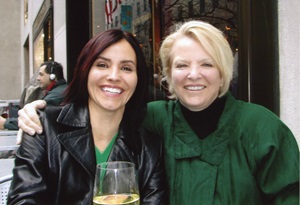Volunteering: The Best Medicine for Grief
By the time Linda discovered she had breast cancer, it was stage IV. After a valiant battle, she succumbed to the disease just a year and half later at 51 years old. For her daughter, Sherri, the loss was devastating.
“Besides being family, my mom and I were best friends and business partners. When she died, I felt my world had come to an end,” says Sherri. “My pain was all-consuming.”
 For Sherri, volunteering became the best medicine for her grief. “My pink passion really began when my mom was alive. We were going to conquer breast cancer and spread the message about early detection and yearly screenings, something we had not put into practice, ultimately leading to my mom finding her cancer at such a late stage,” recalls Sherri.
For Sherri, volunteering became the best medicine for her grief. “My pink passion really began when my mom was alive. We were going to conquer breast cancer and spread the message about early detection and yearly screenings, something we had not put into practice, ultimately leading to my mom finding her cancer at such a late stage,” recalls Sherri.
“After her passing, I became even further committed to try and help others to not have to experience her pain or mine. I began a barrage of pink events, made breast cancer awareness part of the culture of our wholesale beauty supply business and became a volunteer with Susan G. Komen Miami-Ft. Lauderdale.”
That was many years ago. Today, Sherri speaks to local communities on behalf of the Komen organization about the resources they have available to those diagnosed with breast cancer. She gives 16 hours a week to the organization as well as hosting yearly fundraising events. Three years ago, she was asked to become president of the board of Susan G. Komen Miami-Ft. Lauderdale and later became the Race for the Cure committee chair.
“Each role I have played has helped me feel I am truly helping others with their fight against this disease,” says Sherri.
And while Sherri is helping others, volunteering is helping Sherri. “Volunteering is truly ‘chicken soup’ for me,” says Sherri. “Volunteering has helped me keep a positive perspective on my loss. It has helped me not focus on my pain. I still hurt each and every day but I find comfort in helping others.”
For those who are thinking about volunteering after the loss of a loved one, Sherri says, “Life shifts after you lose someone you love, so it’s important not to dwell on the past but to be ‘forward-focused.’ Find something you’re passionate about, find out as much as you can about that and volunteer. By paying it forward, it helps you to cope.”
Volunteering Is Good for the Mind & Body
Studies have shown that volunteering your time to a good cause can improve mental well-being and overall happiness. In a study commissioned by the UnitedHealth Group, the majority of survey participants reported feeling both physically and mentally healthier after a volunteer experience. Most of the participants cited mood improvement, lower stress levels, an enriched sense of purpose and just feeling healthier as a result of volunteering.¹
In its study, The Health Benefits of Volunteering, the Corporation for National Community Service revealed that volunteering improves self-esteem, reduces high blood pressure, increases endorphin production and enhances the immune system. ²
Giving Back as a Way to Honor a Loved One
Volunteering has become a way for Sherri to honor her mother. “I feel my mom’s giving spirit lives in the way I have chosen to honor her life by helping others,” explains Sherri. “She was an inspiration to me. It allows me to help others and also tell her story to so many. I can think of no greater honor than to be able to give back.”
If you’re looking for a way to make a difference in your life and the lives of others, or a special way to honor a loved one, VITAS Healthcare has volunteer opportunities available.
Sources:
¹ http://www.unitedhealthgroup.com/~/media/UHG/PDF/2013/UNH-Health-Volunteering-Study.ashx
² http://www.nationalservice.gov/pdf/07_0506_hbr.pdf